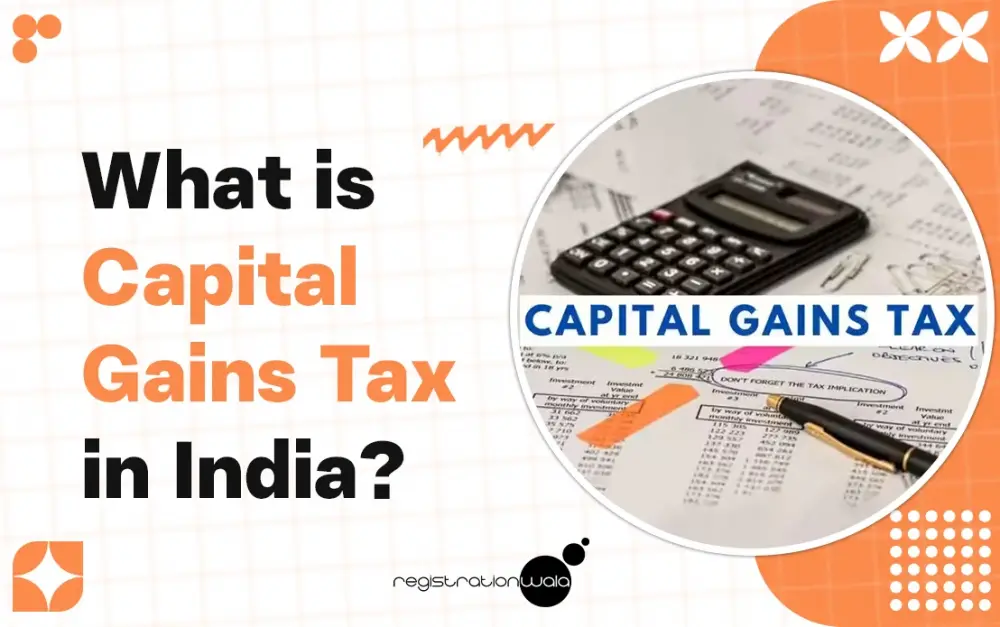What is Capital Gains Tax in India?
- June 15, 2024
- Registrationwala

- Home
- /
- Knowledge Base
- /
- Taxation
- /
- Income Tax
- /
- What is Capital Gains Tax in India?
What is Capital Gains Tax in India?
Capital gains are profits earned when individuals sell capital assets (stocks, real estate or bonds) for a price more than the purchase price. These gains are subject to taxation in India. The tax imposed on capital gains referred to as Capital Gains Tax.
In this article, we will have a detailed understanding regarding what is capital gains tax in India, including capital gains tax types, capital gains tax rate and more.
What are Capital Assets?
Capital assets are assets owned by an individual such as real estate, buildings, houses, cars, jewelry, patents, trademarks and leasehold rights. This also includes owning stakes or having ties to Indian businesses. Apart from these, capital assets also refer to any other legal rights such as control rights or management.
There are certain items which aren’t considered as capital assets by the Government of India such as:
- Personal items such as clothes and furnishings maintained solely by the owner with the exception of jewelry, expensive gemstones, ornaments made up of expensive metals such as silver, platinum or gold, archaeological items, drawings, paintings, sculptures and other art pieces.
- Inventory, consumables or raw materials meant for work-related purpose
- Agricultural land in rural place and special bearer bonds (from 1991)
- Gold deposit bonds issued under 2015’s Gold Monetization Scheme
- Central Government-issued 7% gold bonds (from 1980)
- National Defense Gold Bonds (from 1977)
- Deposit certificates issued under Gold Deposit Scheme in 1999
What does Capital Gains Tax mean?
Let’s understand what capital gains tax means. As capital gains are counted as income, it falls under taxable income’s ambit. The tax which is levied on capital gains is called capital gain tax.
However, simply searching what capital gains tax is not enough if you want to have a deep understanding of this tax concept. According to the existing rules, there are two main factors on which the capital gains tax differs. First, the investment tenure. Second, the type of capital asset which is being sold for profit.
In the further sections of this article, we will discuss the concept of short term and long term capital gains as well as the different capital gains tax rates in the country.
Capital Assets on which Capital Gains Tax is Applicable
Capital Gains Tax is applicable on a wide range of capital assets, including the following:
- Stocks
- Mutual Funds
- Shares
- Property
- ULIP Funds
- Cryptocurrencies
What are Types of Capital Gains Tax?
The capital gains income tax can be divided into two types i.e., long term capital gain tax and short term capital gain tax. Let’s understand both these types of capital gain tax.
What is Long Term Capital Gains Tax (LTCG)?
Long term capital gains means the profit that you make from an investment over a long period. LTCG are the capital gains made from long term capital assets which are held for a period of 1-3 years. Such gains are taxable under the Income Tax Act and are known as "long-term capital gains tax".
What Qualifies as Long Term Capital Gains?
Whether the capital gains made can be considered long term capital gain or not is determined by the period for which you hold your capital assets. The following assets or investments can help you get long term capital gains.
Sale of Property
Assets such as land, buildings and house property are all included under property category. If such immovable properties are possessed by you for over 2 years i.e., 24 months, and you sell them for profit, it will be considered as long term capital gains.
Selling of Stocks
Have you invested in any company shares which are recognized and listed on stock exchange and kept them for over 12 months? If so, then the profit made from selling such shares is also considered as long term capital gain.
Sale of Bonds
It isn’t just equity and preference shares sale that are considered as long term capital gains. Sale of securities like bonds and debentures held for more than 12 months is also counted as long term capital gains.
Sale of Agricultural Land
Do you belong to a farmer’s family and own agricultural land which isn’t located in a rural area? If yes, then the proceeds received on selling such a land will be considered as long term capital gain, which means the proceeds will be taxable under the Income Tax Act.
What is Short-Term Capital Gains Tax (STCG)?
It isn’t just long term capital gains which are taxable under the Income Tax Act. The gains made in the short term are also eligible for tax. Short Term Capital Gains Tax or STCG Tax refers to the tax levied on the profits or gains made by an individual when they sell a capital asset in the short term. A short term duration refers to a period less than 36 months. However, for certain assets, this period is between 12-24 months.
Capital Gains Tax Rate on Long Term Capital Gains and Short Term Capital Gains
The table below shows the capital gains tax rate on long term capital gains and short term capital gains based on the investment type:
Conclusion
If you have sold any capital assets such as stocks, bonds or real estate, then the profit that you’ve made from selling them is known as capital gain. All the taxpayers must file an ITR for capital gains and submit it to the Income Tax Department. If you need assistance with ITR filing for capital gains, you can get in touch with Registrationwala.
- 837 views
